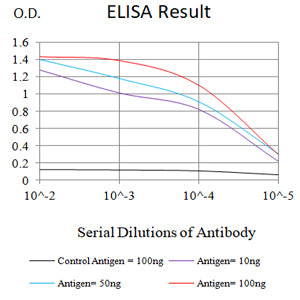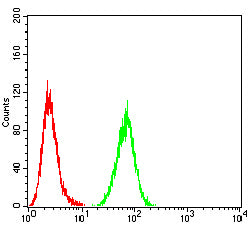


| WB | 1/500 - 1/2000 | Human,Mouse,Rat |
| IF | 咨询技术 | Human,Mouse,Rat |
| IHC | 咨询技术 | Human,Mouse,Rat |
| ICC | 技术咨询 | Human,Mouse,Rat |
| FCM | 1/200-1/400 | Human,Mouse,Rat |
| Elisa | 1/10000 | Human,Mouse,Rat |
| Aliases | p50; Bp50; CDW40; TNFRSF5 |
| Entrez GeneID | 958 |
| clone | 8C8A5 |
| WB Predicted band size | 30.6kDa |
| Host/Isotype | Mouse IgG1 |
| Antibody Type | Primary antibody |
| Storage | Store at 4°C short term. Aliquot and store at -20°C long term. Avoid freeze/thaw cycles. |
| Species Reactivity | Human |
| Immunogen | Purified recombinant fragment of human CD40 (AA: extra(21-193)) expressed in E. Coli. |
| Formulation | Purified antibody in PBS with 0.05% sodium azide |
+ +
以下是3篇关于CD40抗体的代表性文献摘要:
1. **文献名称**: *CD40 Agonists Alter Stromal Microenvironment and Enhance Immune Checkpoint Blockade*
**作者**: Vonderheide RH, et al.
**摘要**: 研究证明CD40激动型抗体可通过激活抗原呈递细胞(如树突状细胞)重塑肿瘤微环境,增强T细胞浸润,并与PD-1/PD-L1抑制剂产生协同抗肿瘤效应,尤其在胰腺癌模型中显著提高疗效。
2. **文献名称**: *Phase I Study of the CD40 Agonistic Antibody SEA-CD40 in Advanced Solid Tumors*
**作者**: Johnson ML, et al.
**摘要**: 首次人体I期临床试验(NCT02376699)评估SEA-CD40抗体安全性及初步疗效,结果显示该抗体可激活外周血和肿瘤内免疫细胞,在黑色素瘤等实体瘤中诱导部分缓解和疾病稳定,验证其临床转化潜力。
3. **文献名称**: *Targeting CD40 in Multiple Myeloma: Preclinical and Early Clinical Evidence*
**作者**: Tai YT, et al.
**摘要**: 研究探讨CD40抗体在多发性骨髓瘤中的作用,发现其可诱导肿瘤细胞凋亡并增强NK细胞介导的抗体依赖性细胞毒性(ADCC),早期临床试验显示与化疗联用可延长患者生存期。
4. **文献名称**: *CD40 Antibody Engineering for Cancer Immunotherapy*
**作者**: White AL, et al.
**摘要**: 综述CD40抗体的结构优化策略(如Fc区改造),分析不同亚型抗体(激动型/拮抗型)的生物学效应差异,强调工程化设计在降低毒性和提升靶向性中的关键作用。
这些文献覆盖了CD40抗体的作用机制、临床前研究及转化医学进展,可作为该领域的核心参考。
CD40 antibodies target the CD40 protein, a cell surface receptor belonging to the tumor necrosis factor (TNF) receptor superfamily. CD40 is expressed on antigen-presenting cells (APCs) such as B cells, dendritic cells, and macrophages, as well as non-immune cells. Its interaction with CD40 ligand (CD40L, CD154) on activated T cells is critical for adaptive immune responses, including B cell activation, antibody class switching, and T cell priming. Dysregulation of CD40 signaling is implicated in autoimmune diseases, cancers, and inflammatory disorders.
Therapeutic CD40 antibodies are designed to either agonize or antagonize this pathway. Agonistic antibodies (e.g., selicrelumab, APX005M) enhance CD40 signaling to boost anti-tumor immunity by activating APCs, promoting T cell responses, and reshaping the tumor microenvironment. These are being tested in cancer immunotherapy, often combined with checkpoint inhibitors or chemotherapy. Conversely, antagonistic antibodies (e.g., lucatumumab, FCP006) block CD40-CD40L interaction to suppress autoimmune or inflammatory responses, showing potential in diseases like rheumatoid arthritis or lupus.
Challenges include managing systemic toxicity, as CD40 activation can trigger cytokine release syndrome. Next-generation antibodies aim to improve selectivity—for example, by engineering Fc domain mutations to limit off-target activation or using bispecific formats to target tumor-associated antigens. Despite mixed clinical outcomes in early trials, CD40 remains a promising immunomodulatory target, with ongoing research exploring optimal dosing, combination strategies, and biomarker-driven patient selection.
×